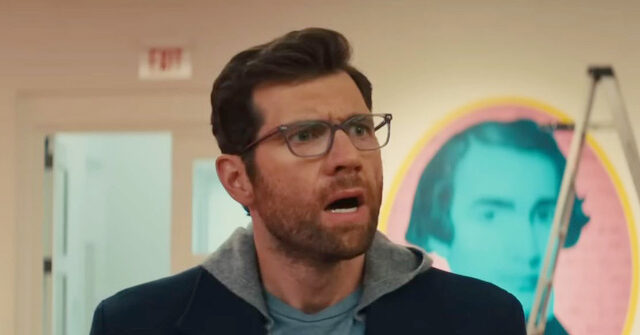Actor-comedian Billy Eichner has publicly expressed his mounting anxiety over the possibility of a second Donald Trump presidency, joining a growing chorus of Hollywood celebrities who are increasingly concerned about the upcoming election. In a fervent TikTok video, Eichner candidly urged fellow Democrats to “panic” and emphasized the urgent need for action as Trump appears to gain momentum in the closing days of the campaign. This urgent tone reflects a sense of desperation among those wary of Trump’s potential return to power.
In the three-minute video, Eichner passionately lambasts Trump, using a series of emphatic vulgarities to convey his disdain. Nevertheless, what stands out is Eichner’s failure to advocate for Vice President Kamala Harris or to articulate any reasons for voters to support her. His tirade centers around an emotional appeal to alarm other voters, yet lacks substantive discussions of policy or the achievements of the current administration, raising questions about the effectiveness of such approaches in rallying support.
The video captures Eichner’s deep-seated frustrations as he interacts with voters, emphasizing a troubling atmosphere he observed during recent encounters. He expressed dismay at the general vibe, suggesting a disconnect between Democratic sentiments and the mood of potential voters. His assertion that Trump is “very, very dangerous” hints at not only a fear of Trump’s policies but also a more profound anxiety about the direction of American democracy should Trump secure another term.
Eichner’s sentiments are echoed by other celebrities who are also experiencing heightened emotions surrounding this election. For instance, comedian Jimmy Kimmel has admitted he is unprepared for another Trump presidency, revealing that the thought has even invaded his dreams. The shared alarm among public figures illustrates a pervasive anxiety that transcends individual celebrity platforms and points to a broader concern within progressive circles as the election draws nearer.
The urgency with which Eichner delivers his message reflects a wider cultural trend where entertainers and public figures utilize their platforms to communicate their political fears and emotions. However, this approach raises critical questions about whether calling for panic without offering constructive solutions or rallying cries can energize a base that may feel as disillusioned about the system as Eichner appears to be. While vehemently anti-Trump sentiments are prevalent, a grounded and actionable vision from the Democratic side remains conspicuously absent in Eichner’s message.
The impact of celebrities like Eichner on political discourse cannot be underestimated, as they serve both to amplify concerns about political figures and to galvanize public sentiment. However, as the election looms, it is crucial for allies to move beyond emotional appeals and develop a coherent strategy that resonates with the electorate. Eichner’s impassioned pleas, while rooted in genuine concern, highlight a need for Democrats to craft a more compelling narrative that champions Harris and the party’s platform if they hope to mitigate the momentum of Trump’s campaign and secure votes in the upcoming election.

